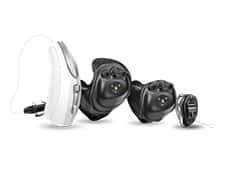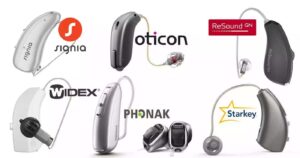The first electronic hearing aids were in use in 1902, but it took another 50 years for the hearing aid technology to fit completely into a device that could be worn on the ears.
In the 1980’s it saw the introduction of digital signal sound processing to an analogue amplifier, and the first completely digital hearing aid was developed in 1996.
“But my NHS hearing aids are digital”
‘Digital’ seems to be a buzz word among many of my patients I visit when they tell me about their NHS hearing aids, which is often why they can’t understand how buying technology privately could be any better.

There have been huge advancements in all types of technology in the last 20 years, including hearing aids.
Look at the advances in mobile phone technology in the past 20 years for example!
Many patients and their families are often confused as to why they have digital hearing aids from the NHS but still seem to struggle with their hearing.
There are many different manufacturers of hearing aids, and those who supply the NHS (the NHS doesn’t make it’s own hearing aids) make a specific range just for NHS patients.
Yes these hearing aids are digital but the computer chips are much less sophisticated than those in the up-to-date hearing systems, which can only be bought privately. It is also very unlikely that the NHS can provide in-the-ear hearing systems offer a range of different colours.
I often find that patients who have tried NHS hearing aids complain that the moulds are very uncomfortable or don’t fit well, they get a lot of whistling and feedback, and the general sound is clear.
Hearing aids should not be uncomfortable and well fitting, modern technology does not whistle if fitted correctly!
It’s very rare that I fit a patient with a hearing aid that has a tube and a full mould. Modern technology can fit a severe level of hearing loss while still being compact and cosmetically pleasing.
Another big difference between NHS and private prescription of hearing aids is the after-care service.
Unfortunately, the NHS has limited resources and time to spend with each patient, but treating hearing loss is more complicated than putting on a pair of glasses and requires ongoing follow-up appointments and rehabilitation.
The first weeks and months after the initial fitting are of particular importance for fine-tuning and adjustments as this is when the brain is going through rehabilitation process to the new level of hearing.
As audiologists we are responsible for making this process as comfortable as possible as well as ensuring the physical fit of the hearing aids are totally comfortable.
Once the patient has rehabilitated they won’t even be aware that they are wearing hearing aids anymore.

The Private Sector
It’s likely that the same hearing aid offered by the national companies will be more expensive from independent dispensers, but that’s because of the quality of the service provided.
We take the time to make sure that we find exactly the right hearing system to suit you and your lifestyle, and we order hearing aids from the manufacturers on an individual basis rather than carrying a large stock.
Every patient is different and one size does not fit all. Working with an independent dispenser will give you a much more bespoke and individual service, and provides continuity in your after care by seeing the same audiologist from the beginning.
We will also give you a free trial period for you to test drive some hearing aids.
Independents also go the extra mile, we provide ear care and wax removal as part of the service, usually with microsuction which can only be performed in hospitals if done through the NHS, we are also fully trained in ear irrigation.
Do not rush your decision
If you have made it this far and you are considering help for your hearing then it’s likely you’ve been struggling with your hearing for at least 5 years or more!
Your hearing will have been slowly deteriorating for many years beforehand so there is no need to rush into making a quick decision on the day you have a hearing test.
Take in all the information and consider everything you have been told. We are not allowed to tell you what hearing we think you should have, and it makes no difference to us which one you choose (we do not work on commission!), it’s completely your decision based on your budget and lifestyle.
The main advice we give is to go for the best you can afford, then you know you couldn’t have done any better for yourself.
